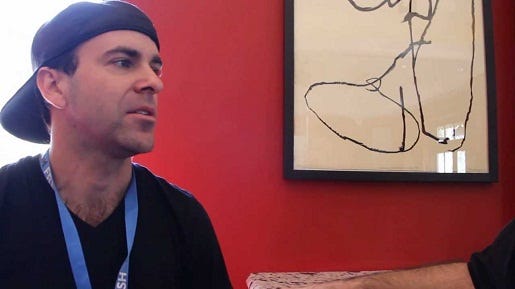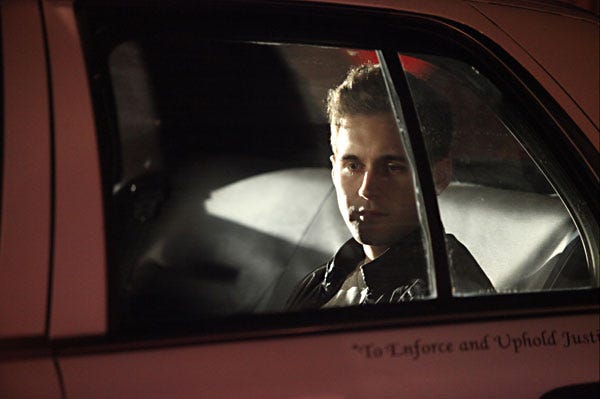Vince Grashaw, Director/Producer/Co-Writer, "Coldwater"
"Coldwater" represents Vince Grashaw's first feature, but he's no newbie to filmmaking.
He produced the 2011 indie hit "Bellflower" and sports an IMDb profile that features credits as a producer, editor, cinematographer and writer.
Grashaw's long-gestating film stars PJ Boudousqué as a juvenile delinquent who is sent by his mother to a "boot camp" run by an ex-marine (James C. Burns), who is given virtually unchecked power over what is essentially a crew of prison inmates.
Grashaw spoke about "Coldwater," why he's happy the film was delayed for more than a decade, why he made it and how to collaborate with others on your own pet project.

Where did you get the idea for "Coldwater"? The film plays a bit like a prison movie on the surface, but it creates a new dynamic by setting it in a juvenile boot-camp type facility.
I originally got the idea to write a script based on these places after I had run into a kid I played hockey with. One night a few years prior, he was abducted in the middle of the night and taken away to a place like Coldwater. I ran into him a few years later and he just wasn't the same kid. He had always been this funny, goofy, charming individual. When I saw him again, he seemed to have lost it, and it appeared was a lot worse than when he went in. I don't know what his life is like now, but it sparked an interest for me to write a story based on this. I still had no idea what a big issue certain juvenile rehabilitation centers were. The scope came over the years of research. I didn't want people to think we were saying all places are like this.
I was struggling with the script and couldn't get it to where I wanted it to be, so in 2003, I brought on my writing partner, Mark Penney, and we literally did a page-one rewrite. Writing with Mark was a pleasure because we complemented each other. With us, it's not like a writers' room where we both sit together and talk and write together. He lives in Canada, I live in Los Angeles. We just would Skype or talk and meet occasionally, but we each took a stab at different portions and fleshed it out to what it is today.
I think aside from making an entertaining, thrilling film, we want people to talk about things opposed to jumping to conclusions. Do your due diligence before signing your child away. I've spoken to several people who have either attended these type of places or families who have lost loved ones — where instructors don't really have any accountability. It's just sad because they really have no voice or people to turn to, and they always ultimately think it's their fault. It's a hopeless feeling. Although "Coldwater" is a fictional story, over the years, it has gained more credibility through cases in reality.
I was really impressed by your lead, P.J. Boudousqué. He is almost a clone of Ryan Gosling, and I mean that in the best possible way. He was tremendous. His acting was strong and he really carried the movie. Can you talk a little about him as a lead?
PJ Boudousqué came out of nowhere quite frankly. He literally walked in for the audition because he lived down the street and it was his last few days in L.A. before moving to New York. I had seen his headshot on the breakdowns and thought he had a good look. But he didn't have any resume, no experience. But when he came in, I remember feeling his presence. It was pretty extraordinary, even for me. There was definitely an instant connection to the character, and I could just feel it. He read literally two scenes out of 21 pages of sides and that was it. I was sold, I think everyone was sold. He's getting a lot of traction from playing this role and I couldn't be happier for the guy. He's gonna do some damage out there.

When you are as close to characters as you were with this film, how much are you able to balance realizing your vision of the characters with what the actor wants to do with the character? Do you find yourself changing your vision of the movie as actors make character choices, or do you default to asking them to alter things a bit?
Directors should not be dictators. It's all about collaborating but knowing what you want. There's nothing worse for a cast and crew than when a director doesn't know what he wants and isn't confident about his choices or communication. The director needs to have a grasp of it in all departments. You're creating a world, so you need to know what the world is at a second's notice if asked by one of your key crew members. In all aspects of production, things evolve, problems arise, you compromise, you get new ideas, other people spring ideas on you. So when I'd sit with PJ, or any actor for that matter, I just wanted him to know that the character was his now. I wanted him to make it his own and feel comfortable turning to me for guidance. Some ideas you vocalize and throw out. Some are gold. It's just a good process to be open to.
What was the key to the success or failure of this film? What one aspect of the film had to be right for the movie to be a complete success, and do you feel like you got that aspect right?
I lived with this movie for so long, and it was almost made several times and fell apart every time; it had worn me out. I had basically come to terms with it never getting made. And to be honest, part of me had moved past this topic as a filmmaker. I didn't even really care to make it anymore because I was so frustrated. In hindsight, I am happy it wasn't made back in 2002 or 2004; it would've been a completely different movie. It was the perfect storm this time around. I had met our executive producer at Flying Pig Productions, Joe Bilotta, in 2011. He had seen our success with my previous film, "Bellflower," and he asked me what else I had on the horizon. I gave him the script for "Coldwater" and he said he wanted to do it. Joe has a post-production studio down in Orange County, and it was where we did most of our post. Our composers, Chris Chatham and Mark Miserocchi, would literally be in the next room over from the editor, Eddie Mikasa, and me. It was a luxury for me as a filmmaker to have access to them right there in the next room every day. We did all the songs and score out of Flying Pig. Even the opera song in the film is ours! That is the one aspect that had to be right to be a complete success. Without someone who believes in you, all you have are white pages with some black ink and a lot of noise. So thanks to Joe for stepping up and making this dream a reality. We nailed it and we have something special to show for it. We got that aspect right in my eyes.

You wore several hats on this film and have some solid indie credits on your resume in a variety of roles. Which aspect of filmmaking do you enjoy most?
I enjoy all aspects of filmmaking — directing, editing, acting, producing, sound design. I think that is why I dabble in all of it, especially on my own films. Without a doubt, I enjoy directing the most. There's just no question. When you produce, you not only have to fall in love with the script, you have to fall in love with the filmmaker. It's awesome when that happens, but it's not as creatively fulfilling, in my opinion. I would only like to produce very select projects because I'd rather focus my attention solely on directing.
Are you looking to "make it" big time in Hollywood, or do you like the relative freedom of the more low-budget indies?
In terms of "making it big," I don't think I even know what that means. The business is changing so much that I think films in the independent world are carrying a lot more weight. People are making more movies and getting more exposure than ever. Am I against making a big-budget film with a studio? Hell, no. I would love to take on a project with a studio. But it all comes down to the script. Making "Coldwater" and "Bellflower" were two totally different experiences, and I learned a lot on both of them. I think if anything, it has prepared me for whatever else comes my way, whether it be films with a studio or independent productions. I don't discriminate.
"Coldwater" has a very cinematic look to it. Visually speaking, your film wouldn't look out of place if you dropped it into a multiplex. A lot of indies tend to have a less-polished look. How do you achieve that? Is it buying the right camera? Lighting? Sets? Or something else?
It's a combination of a lot of things to achieve the final look on a movie. The look of "Coldwater," in terms of its cinematography, is something I talked about with our director of photography, Jayson Crothers, a lot. I didn't want "Coldwater" to come off like one of those stripped-down indies, so from the get-go I wanted to make sure we shot it in a way that would stand on its own and, like you said, not look out of place in a multiplex. I thought the beautiful landscape and cinematography would be a nice contrast to the brutality that the characters endured there. In my opinion, though, the more that can be done in camera, as in when you're shooting, the more money you save in post when coloring it. We were very prepared with how we wanted the movie to look. We shot on the RED EPIC with Panavision Primo Lenses. Usually with a director of photography, you get two out of the three of fast, cheap and good. Without question, I can say Jayson delivered on all of those.


